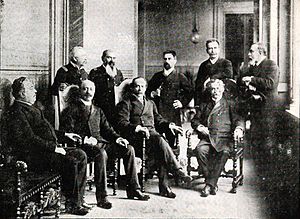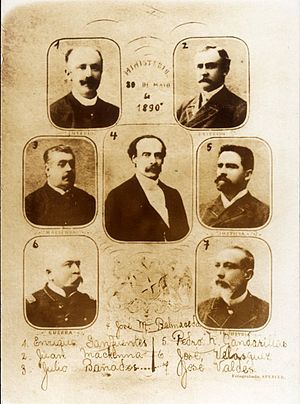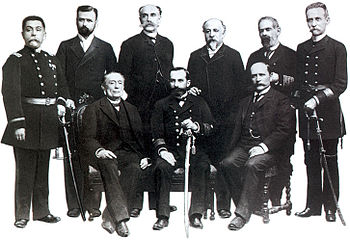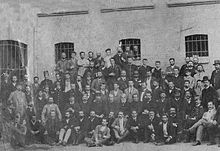Jose Manuel Balmaceda
José Manuel Balmaceda (July 19, 1840, Santo Domingo, Valparaíso Region - September 19, 1891, Santiago) was a Chilean lawyer, journalist, and politician who served as President of Chile. between 1886 and 1891.
He began his government with an ambitious public works plan and with the political ideal of uniting the liberals in a single great party. However, a confrontation with Congress soon began over the struggle between presidentialism and parliamentarism, which turned into a civil war in 1891, after Balmaceda approved the nation's budget without Congress's signature. Defeated his forces in the battles of Concón and Placilla, he committed suicide on September 19, 1891 in the Argentine legation.
Early years of life
Son of Senator Manuel de Balmaceda Ballesteros and Encarnación Fernández. The firstborn among 12 siblings, and born into a wealthy family. He studied at the Colegio de los Sagrados Corazones de Santiago de los Padres Franceses, at the Conciliar Seminary, where he developed an early priestly vocation, which he later abandoned but without becoming anti-religious, and at the National Institute.
Marriage and children
He married Emilia de Toro Herrera on October 11, 1865, from whose union they had six children: José Manuel, Pedro, Enrique, Elisa, Julia and María.
Public life
In 1865 he was appointed secretary of Manuel Montt Torres, during his work at the American Congress in Lima. The former president strongly marked Balmaceda, especially his moral strength, his organizing capacity and his creative energy. At that time he already stood out as a great orator, enjoying enormous prestige.
In 1866 he was Co-founder, with national writers Justo and Domingo Arteaga Alemparte, of the newspaper "La Libertad". He was elected deputy for Carelmapu on four consecutive occasions. Since he appeared in Congress he fully joined the Liberal Reform Party, his work and his parliamentary speeches were developed from 1870 to 1879 within the reformist opposition.
In 1878, President Aníbal Pinto appointed him plenipotentiary minister before the Argentine government, getting the trans-Andean authorities to commit to respecting neutrality during the War of the Pacific.
This management earned him the appreciation of Domingo Santa María, who would appoint him Chancellor in his first cabinet (1881), to later become his Minister of the Interior.
Santa María took him as his successor, being proclaimed candidate for the presidency on January 17, 1886, supported by the National and Liberal parties and a fraction of the Radicals. His possible contender, José Francisco Vergara, withdrew from the presidential race and Balmaceda was elected President of the Republic by 417 votes.
He was proclaimed by Congress as president-elect, in session on August 30, 1886. He assumed command on September 18, 1886.
Presidency of the Republic
Political program
The main postulates of Balmaceda at the beginning of his government were:
- Economic development of the country, through a public works plan, including railways, schools, sewers, roads, hospitals, prisons, etc., with clear decentralizing emphasis.
- Dissemination of a comprehensive and complete public instruction.
- The constitutional consecration of the "freedom of the cults, independence and sovereignty of the State" regarding the church and respect for the religious faith.
- Industrialize the country, through protectionist policies and the direct investment of the state, to diversify production and improve the wages of the working class.
- Reform of municipalities and laws on political parties.
- Join liberalism in a single large family (to date divided into government liberals, dissidents or luminaries and radicals).
Early ministries
Their prime ministers were sworn in together with Balmaceda, who will be:
- Interior: Eusebio Lillo (liberal)
- Hacienda: Agustín Edwards Ross (national)
- Relations: Joaquín Godoy Cruz (liberal)
- Justice, Cult and Public Instruction: Pedro Montt Montt (national)
- War and Marina: Evaristo Sánchez (liberal)
The first step for the president and his cabinet was to end the theological struggle, ending a problem that dated back to the Pinto administration. It happened that the archbishopric of Santiago had been vacant since the death of Rafael Valdivieso, as the government tried to use the right of patronage to leave Don Francisco de Paula Taforó in office, rejected by the ultramontane ecclesiastics who boycotted his election in Rome.
This conflict reached more serious edging during the Santa María administration, as this president broke relations with the Holy See.
Now Balmaceda, although a liberal and a collaborator of Santa María, wanted to reconcile the government and the church, and sought a consensus candidate between the two, from which the candidacy of Mariano Casanova emerged.
On December 3, Leo XIII signed Casanova's recommendation, putting an end to a fight that all of Chile was fed up with. Minister Lillo repeated the municipal elections of Santiago, because the previous ones were flawed. The victory was obtained by the opposition, showing the government a correction not seen before.
However, this ministry, which had the applause of an entire country, had to face opposition from dissident liberals, who wanted to overthrow this ministry and replace the nationals in government.
Lillo gave his resignation because he did not have the support of these liberals, who carried out parliamentary obstruction using the lack of closure of the debate.
The new ministry was headed by Carlos Antúnez. This was dedicated to proposing a new regulation for the Chamber of Deputies, to avoid actions such as those that brought down the Lillo ministry, but there was so much opposition that it was only possible to approve the closure of the debate on the laws of contributions, budget and residence of the army.. The ministries were also raised from five to six, creating that of Public Works.
In his presidential speech on June 1, 1887, President Balmaceda rightly raised the unity of the liberals, for which a new ministry was created with dissident liberals, who demanded two ministries, despite their poor parliamentary representation. Thus the ministry was formed by two liberals, two dissident liberals and two nationals.
In 1888 the parliamentary elections were held, more correct than the previous ones but not lacking in intervention, in which the opposition advanced some seats.
The dissidents convinced Balmaceda to form a solely liberal cabinet, expelling the nationals. The president accepted the proposal and the nationals went to the opposition. Double mistake, expelling the nationals took away the best men in the administration and the dissidents admitted to the government would be a Trojan horse that would destroy the bases of their government.
The conflict with Congress
Cabinets come and go, the political crisis led by the break with the nationalists leaves the government with an increasingly weak majority in the Chamber of Deputies, while some government liberals escape the fold to join the dissidents or the nationals (mocetone liberals). It is then that Balmaceda calls the radicals to form part of the government. His dream of the unification of the liberals seems fulfilled, but it would be a fragile illusion that would break at the first breath.
And this blow came when the nationals, radicals, dissidents and mocetones, tired of the “versatility of the president”, formed a political group that Balmaceda contemptuously called the “quadrilateral“. This new force had a power almost comparable to the increasingly weak government liberal party, so Balmaceda had to give in and form a ministry with the “quadrilateral”, whose step would be very difficult. briefly, due to the fight between the "quadrangle" and Balmaceda's candidate for his succession, Enrique Sanfuentes.
The “quadrilateral” program can be summarized as: electoral freedom, independence of the parties from the executive and the implementation of a parliamentary system of government.
Balmaceda finally understood that his dream of liberal unification was a failure, and he armed himself for battle against the opposition, which wanted to strip the president of his powers. He canvassed for support in the Conservative party, but failed to get enough support. He dispensed with Sanfuentes as a candidate, anointing Claudio Vicuña as his candidate, while the opposition makes and breaks ministries by presenting votes of no confidence, even before they had even been presented to congress.
The Break
When he lost his parliamentary majority, Balmaceda had to appoint cabinets in accordance with the new distribution of political forces, which lasted until January 1890, when he appointed a cabinet of a markedly presidential character, since congress had not approved the periodical laws of that year since it was totally sold to the English interests of the nitrate. The ministry was headed by Adolfo Ibáñez, and had the peculiarity of being Balmaceda's first cabinet with military integration, with General José Velásquez as Minister of War, which would mean the beginning of the politicization of the army and its subsequent division during the war. civilian.
On May 30, the cabinet was reformed, naming Sanfuentes Minister of the Interior, an issue that inflamed the parliamentary opposition, who used the postponement of the discussion of the Budget Law of 1891, to provoke the change of ministries by another of parliamentary court.
The parliamentarians, spurred on by the English crown, which sought to recover the nitrate mantles of the great north of the country, hoped to constitutionally accuse the cabinet of Sanfuentes, since in such a situation, the constitution established that the president could not modify the ministry and after six months he might even find himself disqualified from governing.
Faced with such pressure, the president prepared a plan with his close ministers and military, to dissolve congress. The coup d'état was averted with the intervention of Archbishop Mariano Casanova, who reached an agreement between the government and the opposition to approve the contributions law, with the condition of appointing a parliamentary cabinet in his cabinet. This was the ministry of Belisario Prats, which did not have military integration and meant a last truce between the competing powers, but it was dissolved due to the problem of future presidential elections and the unavoidable differences between the president and his interior minister. In October 1890, he appointed a cabinet Presidential in nature, with Claudio Vicuña as Minister of the Interior. To avoid constitutional accusation, Balmaceda closed the extraordinary sessions of congress, despite the fact that the budget laws had not been approved.
Hatred and political tension were growing, and it could be seen in the press. In addition to accusing Balmaceda of being a tyrant, they also attacked his person, it was said that he had a “mean spirit of revenge”, of launching against society a gang of infamous assassins, recruited “ in the slums and in prisons". She was accused of having delicate appearances and features of a slut, also questioning her mental health.
President Balmaceda also attacked the “Jews and revolutionaries” who had dared to rise up against him.
An incident further heated the atmosphere. On December 19, a large rally was called at the Conservative Club, which the police tried to break up by force. Some, however, fought with the agents, which wounded the young Isidro Ossa Vicuña. Although he managed to escape, his wound worsened and he died in the arms of his mother, generating strong animosity against the government. [citation needed ]
Both parties refused to give in, so when 1891 arrived, Balmaceda established by decree the extension of the previous year's budgets (January 1). This led to the institutional crisis, the National Congress declared the President outlawed, to which Balmaceda responded by establishing the dictatorship, assuming all the public power necessary for the administration and government of the state and the maintenance of internal order.
Relying on the Navy, led by captain Jorge Montt Álvarez, and part of the army, Congress moved to Iquique and from there directed the war against the president, who was supported by part of the Army.
The president issued the following decree:
Bearing in mind:That the Congress has not promptly dispatched the budget law for the present year;
As the budget law is passed for the present year of 1891, those that were approved for the year 1890 by the law of 31 December 1889
That it is not possible, that while the law is enacted, to suspend public services and the external security of the republic, decree:
Balmaceda deviated from the constitution by transferring his powers. At the same time, the rebel congressmen launched a manifesto that says:
1o That the President of the Republic, Don José Manuel Balmaceda, is absolutely unable to continue in the exercise of his post, and therefore ceases in him from this day;2nd They are equally impossible to replace him in that position with their Ministers of the Deacho and the State advisers who have been their accomplices in the attacks against constitutional order.
Santiago, 1 January 1891.
And therefore, we designate Don Jorge Montt to help Congress to restore the rule of the Constitution.
1891 Civil War
On January 6, the squadron, which was transporting the main leaders of the revolution, revolted, but the army did not fold, so the President-Congress conflict became a civil war.
In its beginnings, this did not even seem to exist, the squadron did not land anywhere and it was called “the traveling revolution”. But things would soon change, as the squadron headed north, where it would be difficult for them to be attacked by the regular army and where they would manage the riches of the nitrate. Due to the battles over the Iquique and Pozo Almonte customs, the revolutionaries dominated the north, setting up a government junta, chaired by Jorge Montt, and made up of Waldo Silva and Ramón Barros Luco.
The government sent to the north the torpedo boats “Lynch” and “Condell”, which sank the “Blanco Encalada”.
While the "Revolutionary Committee" was operating in Santiago, led by Carlos Walker Martínez, its objective was to coordinate actions against the Balmaceda government in the capital. This committee would have to deal with Minister Domingo Godoy.
Godoy's enemies within the government (which were many) managed to remove him, at the same time that parliamentary and presidential elections were called, where only those close to the president were elected. Claudio Vicuña was elected president-elect.
After Godoy had fallen, on August 20 a group of young opponents of Balmaceda met at the Lo Cañas farm belonging to conservative senator Carlos Walker Martínez, awaiting instructions from the committee, when they were surrounded by the army. After a trial, they were all executed under torture, some even being unable to walk to the gallows. The massacre was ordered by Colonel Orozimbo Barbosa. This event was a direct blow to the morale of Balmaceda's supporters and an already demolished cross still remains today at the intersection of Walker Martínez and Tobalaba avenues, in the commune of La Florida. This episode is remembered as the "Lo Cañas Massacre".
The revolutionaries prepared their army, improvised with sailors and saltpeter workers, trained by the German Emilio Koerner, who trained them according to the new Prussian techniques. The rebels disembarked between the ports of Valparaíso and Quintero, going to Concón, where they put up a battle against the government army, the former victorious. This victory was ratified with the Battle of Placilla, in the upper part of Valparaíso, which marked the end of Balmaceda's hopes and the triumph of the revolution.
Death
Balmaceda delegated command to General Manuel Baquedano, to maintain order in Santiago due to possible reactions to the revolutionary victory. He sent his family to the United States embassy, while he did the same at the Argentine legation.
Baquedano did not know or could not overcome the incidents of the day after: the victors looted and burned the houses of the defeated. Many of the Balmacedistas had to hide and go into exile. The house that Balmaceda was building was saved because someone painted For Colonel Del Canto.[citation needed]
After three days in office, the general conferred power on the revolutionary committee and retired to his home.
Meanwhile, Balmaceda in the Argentine legation did not want to be informed of the events; only days later he began to read the first newspapers, which launched fierce attacks against him. He thought about turning himself in to the junta, but considered that he would be tortured and then shot. In the Legation he was protected by Minister Uriburu, who even studied with the conservative leader Carlos Walker a possible escape through his house, a neighbor of the Legation. There he wrote a & # 34; political testament & # 34;, from which the main paragraphs are extracted:
“My public life has ended. I also owe my friends and my fellow citizens the intimate word of my experience and my political conviction."
- "While the parliamentary government remains in Chile in the way and manner in which it has been wanted and as the triumphant revolution sustains it, there will be neither electoral freedom nor serious and constant organization in the parties, nor peace between the circles of Congress.
- The triumph and subjugation of the fallen will produce a momentary stillness; but before long the old divisions, bitterness, and moral breaches will be reborn for the Head of State."
- "Only in the organization of the representative popular government with independent and responsible powers and easy and expeditious means to give effect to the responsibility, there will be national parties and derivatives of the will of the peoples, and harmony and respect among the fundamental powers of the State."
- "The parliamentary regime has triumphed in the battlefields; but this victory will not prevail. Or the study, conviction and patriotism open a reasonable and peaceful way to reform and to the organization of the representative government, or new disturbances and painful disturbances will have to occur among the same ones that have made the revolution united and that maintain the union for the strengthening of the triumph, but that will finally come to an end by dividing and colliding. These eventualities are more than in the nature and spirit of men, in the nature of the principles that today triumph and in the strength of things."
- "This is the destiny of Chile and I hope that the cruel experiences of the past and the sacrifices of the present will induce the adoption of the reforms that will make me fruitful the organization of the new government, serious and stable the constitution of the political parties, free and independent the life and functioning of the public authorities and undermined and activates the common elaboration of the progress of the Republic".
- "We must not despair of the cause we have sustained or the future."
- "If our flag, the incarnation of the government of the truly republican people, has fallen flattened and bloodied in the battlefields, will be lifted again in a time not far away, and with numerous and more fortunate defenders than we, will flame a day to honor the Chilean institutions and to the bliss of my homeland, to which I have loved over all things of life.
- When you and your friends remember me, believe that my spirit, with all your most delicate affections, will be in the midst of you.”
Finished writing all the letters, at dawn on September 19, he lay down in bed, resting his head on the left side. With his right hand he pointed a revolver - which had been given to him by the agent of Smith & amp; Wesson in Chile—in the head, and pulled the trigger. It was eight o'clock in the morning.
News of his death spread quickly. So many people crowded into the Argentine delegation that they had to be dispersed by the troops. The body was secretly moved to the cemetery during the night. The urn was deposited in the tomb of the Arrieta Family, but to avoid desecration it was transferred to another tomb. Finally, on November 26, 1896, Balmaceda's body was transferred to his family's mausoleum, in apotheosis, tributed by his admirers, with the sympathy of many of his adversaries and the indulgence of almost all of them. enemies of him.
With Balmaceda, the Portaliano regime and the presidential authoritarianism also died. The last word in power would now be held by the triumphant oligarchy that would rule until 1920.
Works and legacy
During the Balmaceda Administration, the following milestones related to public works were recorded:
- Construction and inauguration of the Viaducto del Malleco, the highest road engineering work in South America.
- Establishment of the railway network towards the so-called Border and towards Mendoza, Argentina (Transandino Railway).
- Fundación del Instituto Pedagógico de la Universidad de Chile.
- The policy of cession of landowners in the Araucanía that protected the Mapuche ethnic group of large landowners.
- Increase in the fiscal epoch following Salitre exports abroad.
- Electric lighting in streets and installation of telephone networks in the city of Santiago and Valparaiso.
- Creation of the Ministry of Public Works MOP.
- Channeling the Mapocho River.
- Fundación del Internado Nacional Barros Arana.
- Modernization of main ports of Chile.
- Fundación de la Escuela de Medicina de la Universidad de Chile y de la Escuela de Dentística de la Universidad de Chile.
- Creation of the Catholic University of Santiago.
- Construction of the main building of the Bernardo O`Higgins Military School.
- Incorporation of Easter Island into Chilean territory.
Tributes and recognitions
The enormous mausoleum where Balmaceda's tomb is located, is a place of popular veneration by Chilean high school and university students, who come to ask for his intercession to pass a key exam or win the heart of a girl. The walls of the tomb are invaded by these requests.
In his honor, a city in the Aysén Region, founded in 1927, was named Balmaceda, and an important road artery in the commune of Santiago also bears his name. There are also avenues named after him in Antofagasta, La Serena, Curicó, San Javier, San Antonio and Temuco.
The Balmaceda Park is located in the Providencia commune, which begins with the monument in his honor sculpted by Samuel Román and extends to Huelén street.
One of the main avenues of the Renca commune, named after José Manuel Balmaceda, runs from East to West and vice versa between Av. Condell and Av. Apóstol Santiago.
Two high schools bear his name in Curacaví and In Independencia, as well as a professional technical school located in San Bernardo.
Carlos Tromben published the historical novel Balmaceda: the war between Chileans in 2016. Isidora Aguirre reconstructed the last days of President José Manuel Balmaceda in his work Dialogue of the end of the century .
The Liberal Party has recovered its heritage and established the Fundación Presidente Balmaceda, aimed at spreading its ideology.
Electoral history
1886 Presidential Election
- Presidential elections of 1886
| Candidate | Party | Coalition | Votes | % | Outcome |
|---|---|---|---|---|---|
| José Manuel Balmaceda Fernández | Liberal Party | Liberal Party | 324 | 98.18 | Chairman |
| José Francisco Vergara Etchevers | Radical Party | PR-PN-PL (dissidents) | 6 | 1.82 | |
| Total valid votes | 330 | 100% | |||
| Total registered | 122 583 | Abstaining: 59.44% | |||
| Total electors | 342 | ||||
Contenido relacionado
Trajan
Years 440 a. c.
Dmitri Mendeleyev








